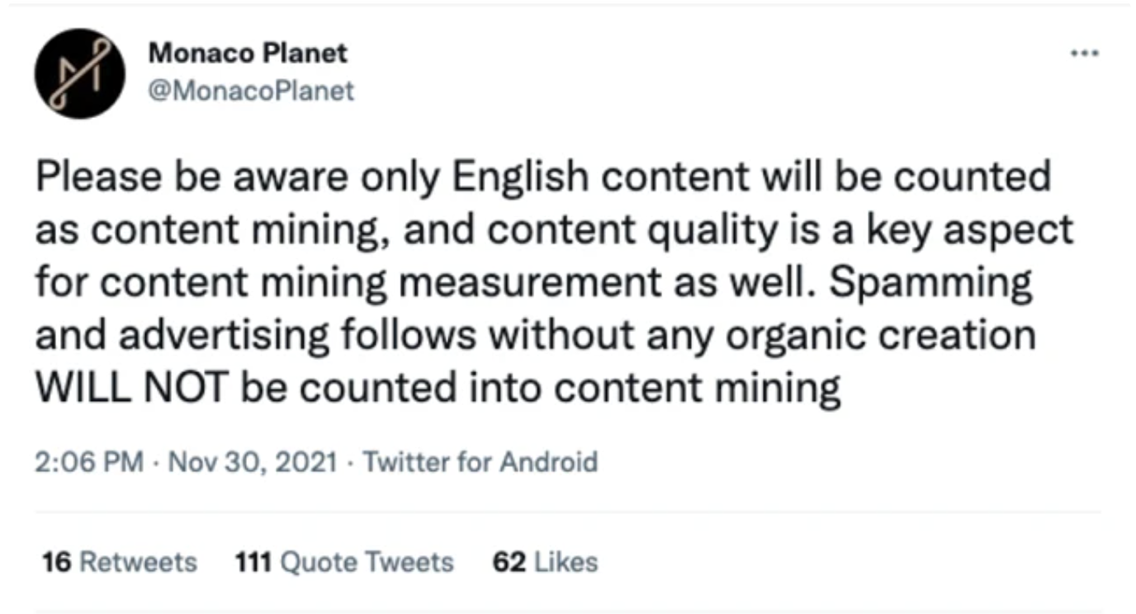Along with its rapid advancement, the Internet has turned the world into an interconnected global village. The way we socialize with one another has transitioned from letters through SMS to today’s social platforms such as WeChat, Twitter, and Facebook. According to the relevant reports in 2020, the social media had a total of 3.484 billion active users last year, and the figure is still growing in 2021. These folks spend 153 minutes browsing and posting information on social media every day.
However, in the Web 2.0 era, every bit of data we generate on traditional social platforms is controlled by the giants who have monopolized Web 2.0. They have utilized or even sold the value generated by such data. We feel helpless against such abuse, unless we stop using the Internet.
From Bitcoin to the development of DeFi, the metaverse, and Web 3.0, blockchain technology has made everything possible. Powering this momentum, a number of high-quality projects in the Web 3.0 social segment have received substantial investments. These projects aim to address the pain points in traditional SNS by leveraging blockchain technology. As they disrupt the conventional SNS model, a new generation of SNS platforms called SocialFi that incorporate socialization, finance, and NFT trade have emerged as a result.

Today, we will talk about two trending SocialFi projects: DeSo and Monaco Planet.
I. DeSo
Launched to build a Web 3.0 social network, DeSo has fostered BitClout, a social-media-on-the-blockchain project. In September, the public chain also received $200 million funding from well-known VC institutions, including a16z, Sequoia, and Coinbase Ventures.
On BitClout, you will find blockchain-specific features like the creator coin (a social token), tips, and NFT trading, apart from regular social functions like posting, liking, commenting, and following. The incentive mechanism of creator coin allows BitClout creators to profit from their expanded influence through high-quality content. On BitClout, all users have their own creator coin, which is automatically generated when they claim the user profile. The token price fluctuates according to the amount purchased by followers. Moreover, users can purchase creator coins with DESO, DeSo’s native token.
If you like a creator, you can buy his/her creator coin, which financializes their personal influence. For instance, although Elon Musk has never posted a post on BitClout, his huge personal influence gained him 309 coins in circulation, with a TVL of $2.888 million (funds locked by followers who purchased Elon Musk’s creator coin).

The introduction of the creator coin, tips, and NFT trading has reshaped the way creators make money on the Internet. But this is just the beginning. Since DeSo is open source, anyone can try to find new ways to profit as a creator by building applications on DeSo.
II. Monaco Planet
A few days earlier, Monaco Planet has gone viral on Twitter, Facebook, and Discord through hunger marketing, and its invitation code is now sold for $100. As Monaco Planet now remains in the beta stage, users can only get registered by purchasing an NFT called “Yacht” on the Opensea marketplace. A user holding five invitation codes could use them to invite five other users. Right now, even the cheapest Yacht costs 0.1459 ETH (about $585). Clearly, few users can afford such a price, and most folks plan to get free access to its beta test. This is why plenty of people are looking for invitation codes on social platforms.
Since it is a SocialFi platform, Monaco Planet’s ownership and governance rights are determined by users. Earned by publishing high-quality content, MONA is the governance token of Monaco Plane, and also an all-purpose token of its ecosystem. By introducing the “write-to-earn” model, Monaco Plane has added new metrics to the content reward formula, incorporating the number of fans, likes, and comments. In addition, it distributes the MONA rewards once a week.
Although such clever marketing tactics have brought Monaco Plane considerable publicity, it remains questionable whether it could retain users relying on its strength and unique SNS model. After all, this SocialFi platform is not yet open to all users. Moreover, the language restriction it recently set on content creation has led to strong protests among Chinese-speaking users.
On November 30, Monaco Plane posted a tweet, stating that only publishing English content will be considered valid in the “write-to-earn” model. Soon after this tweet, members from its Chinese community voiced their protests, which has led to a price drop of Yacht from 0.35 ETH to 0.14 ETH.

Conclusion
Although the SocialFi ecosystem has gradually matured along with Web 3.0 developments, it faces competition from traditional SNS giants like Facebook and Twitter. There is plenty of time for SocialFi to grow. As the sector embraces the Web 3.0 boom, the key to its growth lies in product development. Given that SocialFi focuses on social platforms, users surely are the top priority. In addition, considering that blockchain is essentially an open and inclusive community, there is no doubt that discriminatory practices like that on Monaco Plane are inadvisable.
* The above content may not be relied on as any investment advice.